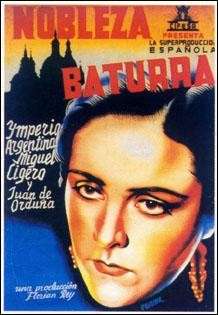Nobleza baturra
Nobleza baturra (The Nobility of the Peasantry,[2] also known as Aragonese Virtue) is a 1935 Spanish musical drama film directed by Florián Rey, and starring Imperio Argentina, Miguel Ligero Rodríguez, and Juan de Orduña, based on the play by the playwright Joaquín Dicenta. The film was a phenomenal success, and one of the most commercially successful films of the Second Republic. The film was made by CIFESA at CEA Studios.[3] The film was noted for its folkloric type characters and sentimental views of rural peoples.[2]
| Nobleza baturra | |
|---|---|
 | |
| Directed by | Florián Rey |
| Written by | Joaquín Dicenta Boadillo |
| Starring | Angelillo |
| Music by | Rafael Martínez and José L. de Rivera |
| Cinematography | Enrique Guerner, José María Torres |
| Edited by | Eduardo García Maroto |
Release date |
|
Running time | 86 minutes[1] |
| Country | Spain |
| Language | Spanish |
Plot
The film, set in Aragon in the early twentieth century, tells the story of María del Pilar (Imperio Argentina), an honest girl, whose good name is tarnished when a former suitor, out of spite of being rejected, publicizes throughout the village that she had sex outside of marriage. Slander soon spreads throughout the region.
Cast
- Imperio Argentina as María del Pilar
- Miguel Ligero Rodríguez as Perico
- Juan de Orduña as Sebastián
- José Calle as Tío Eusebio
- Manuel Luna as Marco
- Carmen de Lucio as Filomena
- Pilar Muñoz as Andrea
- Juan Espantaleón as Padre Juanico
- Blanca Pozas as Doña Paula
References
- Lera, José María Caparrós; Crusells, Magí; España, Rafael de (30 March 2007). Las grandes películas del cine español. Ediciones JC. p. 24. ISBN 978-84-89564-50-3. Retrieved 15 July 2012.
- Hernandez-Rodriguez, R.; Rodríguez, Rafael Hernández (2010). Splendors of Latin Cinema. ABC-CLIO. p. 20. ISBN 978-0-313-34978-2. Retrieved 15 July 2012.
- Bentley, Bernard P. E. (2008). A Companion to Spanish Cinema. Boydell & Brewer Ltd. p. 66. ISBN 978-1-85566-176-9. Retrieved 15 July 2012.